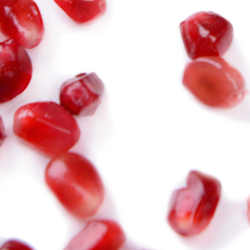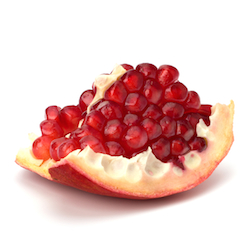Regular intake and regular consumption of pomegranate has many health benefits including reducing inflammation. Researchers are working on defining a standardized dose with the end result of developing a drug to prevent the neuro-inflammation related to dementia, which could slow the progression of the disease. In this study (in the slideshow), the effects of punicalagin on neuroinflammation in LPS-activated microglia were investigated in an animal model. Researchers are using this data to research whether a new drug derived from pomegranate is possible.
 The key breakthrough by University of Huddersfield scientist Dr Olumayokun Olajide, who specializes in the anti-inflammatory properties of natural products. and his co-researchers are working to demonstrate is that punicalagin, which is a polyphenol – a form of chemical compound – found in pomegranate fruit, can inhibit inflammation in specialised brain cells known as micrologia. This inflammation leads to the destruction of more and more brain cells, making the condition of Alzheimer’s sufferers progressively worse. There is still no cure for the disease, but the punicalagin in pomegranate could prevent it or slow down its development.
The key breakthrough by University of Huddersfield scientist Dr Olumayokun Olajide, who specializes in the anti-inflammatory properties of natural products. and his co-researchers are working to demonstrate is that punicalagin, which is a polyphenol – a form of chemical compound – found in pomegranate fruit, can inhibit inflammation in specialised brain cells known as micrologia. This inflammation leads to the destruction of more and more brain cells, making the condition of Alzheimer’s sufferers progressively worse. There is still no cure for the disease, but the punicalagin in pomegranate could prevent it or slow down its development.
“Punicalagin inhibits neuroinflammation in LPS-activated rat primary microglia,” by A. Olumayokun A. Olajide, Asit Kumar, Ravikanth Velagapudi, Uchechukwu P. Okorji and Bernd L. Fiebich, published by Molecular Nutrition & Food Research.
This new drug was based on research showing that punicalagin has the ability to reduce the production of TNF-α, IL-6 and prostaglandin E. The study suggested that punicalagin inhibits neuroinflammation in LPS-activated microglia through interference with NF-κB signalling, suggesting its potential as a nutritional preventive strategy in neurodegenerative disorders.
Dr Olajide worked with co-researchers – including four PhD students – in the University of Huddersfield’s Department of Pharmacy and with scientists at the University of Freiburg in Germany. The team used brain cells isolated from rats in order to test their findings. Now the research is published in the latest edition of the journal Molecular Nutrition & Food Research and Dr Olajide will start to disseminate his findings at academic conferences.
He is still working on the amounts of pomegranate that are required, in order to be effective. “But we do know that regular intake and regular  consumption of pomegranate has a lot of health benefits – including prevention of neuro-inflammation related to dementia,” he says, recommending juice products that are 100 percent pomegranate, meaning that approximately 3.4 per cent will be punicalagin, the compound that slows down the progression of dementia.
consumption of pomegranate has a lot of health benefits – including prevention of neuro-inflammation related to dementia,” he says, recommending juice products that are 100 percent pomegranate, meaning that approximately 3.4 per cent will be punicalagin, the compound that slows down the progression of dementia.
Dr Olajide states that most of the anti-oxidant compounds are found in the outer skin of the pomegranate, not in the soft part of the fruit. And he adds that although this has yet to be scientifically evaluated, pomegranate will be useful in any condition for which inflammation – not just neuro-inflammation – is a factor, such as rheumatoid arthritis, Parkinson’s and cancer.
The research continues and now Dr Olajide is collaborating with his University of Huddersfield colleague, the organic chemist Dr Karl Hemming. They will attempt to produce compound derivatives of punicalagin that could the basis of new, orally administered drugs that would treat neuro-inflammation.
Dr Olajide has been a Senior Lecturer at the University of Huddersfield for four years. His academic career includes a post as a Humboldt Postdoctoral Research Fellow at the Centre for Drug Research at the University of Munich. His PhD was awarded from the University of Ibadan in his native Nigeria, after an investigation of the anti-inflammatory properties of natural products.
The article “Punicalagin inhibits neuroinflammation in LPS-activated rat primary microglia”, by A. Olumayokun A. Olajide, Asit Kumar, Ravikanth Velagapudi, Uchechukwu P. Okorji and Bernd L. Fiebich is published by Molecular Nutrition & Food Research.




